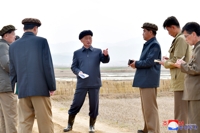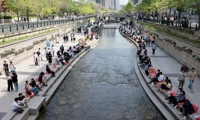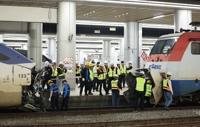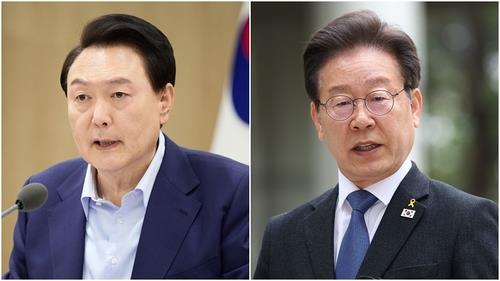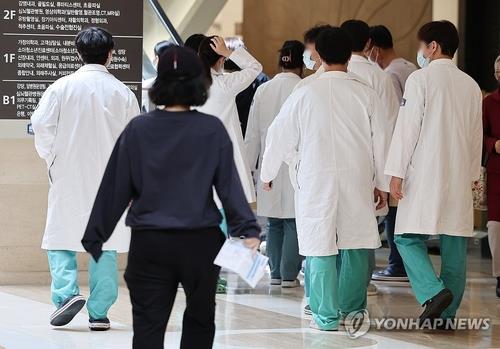Pentagon official calls for distributing 'heavily concentrated' U.S. troop presence from Northeast Asia
By Oh Seok-min
SEOUL, Sept. 1 (Yonhap) -- U.S. troops are concentrated in Northeast Asia and should be distributed to better respond to evolving security challenges, including China, a senior Pentagon official has said.
"We are heavily concentrated in Northeast Asia," David Helvey, assistant secretary of defense for Indo-Pacific affairs, said, according to a news report by the U.S. Department of Defense news on Monday.
"We'd like to be able to make our presence more geographically distributed, more operationally resilient," Helvey said. "Maybe, the future is going to be less about bases and more about places -- being able to operate across a multiplicity of locations, which give us the flexibility and the agility to respond to a variety of different threats and challenges."
His comments came when the U.S. has been pushing for greater "strategic flexibility" for its forces deployed around the world amid speculation that it could consider pulling some troops out of South Korea.
Defense Secretary Mark Esper said earlier that he wants to pursue more rotational force deployments into theaters as it give the U.S. greater strategic flexibility in terms of responding to challenges around the globe, though he stressed that he has not issued an order to withdraw forces from the Korean Peninsula.
South Korea's defense ministry also made it clear that any reduction of the U.S. Forces Korea (USFK) has not been discussed between the two sides. Currently, around 28,500 U.S. service members are stationed in South Korea.
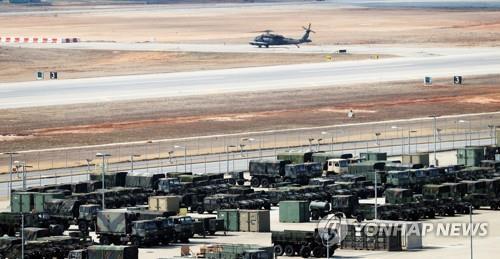
This photo taken on Feb. 27, 2020, shows the U.S. Forces Korea's Camp Humphreys in Pyeongtaek, Gyeonggi Province. (Yonhap)
Helvey then said that the flexible presence is to ensure the U.S. is resilient in the face of a variety of threats, including China.
"One of the key things in our strategy is talking about putting the relationship with China on a trajectory of transparency and non-aggression," the official said. "That's going to require a sustained, open channels of communication with the Chinese — the secretary has talked to his Chinese counterpart a number of times already."
The U.S. and China may have issues of common interest where they could work together, such as North Korea and COVID-19.
"There's other areas where we may have opportunities to cooperate based on shared interest, but that's something we have to work in with Chinese to identify," he said.
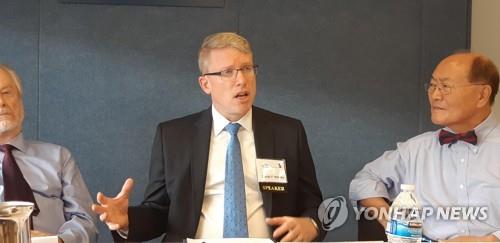
This photo taken on Oct. 20, 2019, shows David Helvey, assistant secretary of defense for Indo-Pacific affairs. (Yonhap)
graceoh@yna.co.kr
(END)
-
 Overdue debut of Korean abstract art pioneer Yoo Young-kuk at Venice Biennale
Overdue debut of Korean abstract art pioneer Yoo Young-kuk at Venice Biennale -
 Defense chief says N. Korea's hypersonic missile 'unsuccessful' in last-stage glide flight
Defense chief says N. Korea's hypersonic missile 'unsuccessful' in last-stage glide flight -
 Relax, immerse yourself in scents at Venice Biennale's Korean Pavilion
Relax, immerse yourself in scents at Venice Biennale's Korean Pavilion -
 N. Korea has capability to genetically engineer biological military products: U.S. report
N. Korea has capability to genetically engineer biological military products: U.S. report -
 S. Korea marks 30th anniv. of Korean Pavilion at Venice Biennale with contemporary art
S. Korea marks 30th anniv. of Korean Pavilion at Venice Biennale with contemporary art
-
 Overdue debut of Korean abstract art pioneer Yoo Young-kuk at Venice Biennale
Overdue debut of Korean abstract art pioneer Yoo Young-kuk at Venice Biennale -
 Relax, immerse yourself in scents at Venice Biennale's Korean Pavilion
Relax, immerse yourself in scents at Venice Biennale's Korean Pavilion -
 S. Korea marks 30th anniv. of Korean Pavilion at Venice Biennale with contemporary art
S. Korea marks 30th anniv. of Korean Pavilion at Venice Biennale with contemporary art -
 Defense chief says N. Korea's hypersonic missile 'unsuccessful' in last-stage glide flight
Defense chief says N. Korea's hypersonic missile 'unsuccessful' in last-stage glide flight -
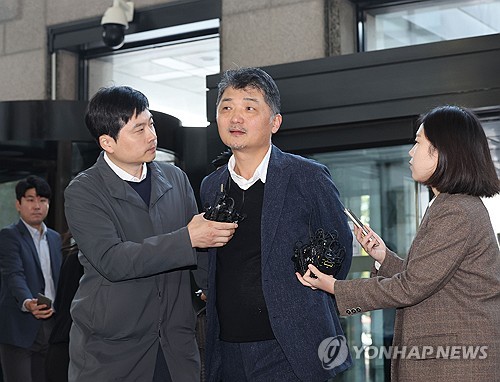 Questioning necessary for Kakao founder for suspected stock rigging: prosecution
Questioning necessary for Kakao founder for suspected stock rigging: prosecution
-
 Gov't likely to accept university chiefs' request to lower med school enrollment quota
Gov't likely to accept university chiefs' request to lower med school enrollment quota -
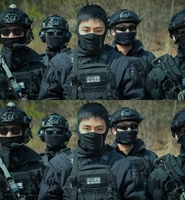 Facebook page unveils photos of BTS member V in counter-terrorism unit gear
Facebook page unveils photos of BTS member V in counter-terrorism unit gear -
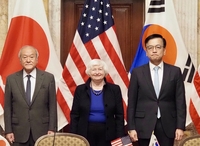 (4th LD) Finance chiefs of S. Korea, U.S., Japan recognize 'serious' concerns over 'sharp' won, yen depreciation
(4th LD) Finance chiefs of S. Korea, U.S., Japan recognize 'serious' concerns over 'sharp' won, yen depreciation -
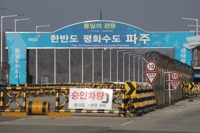 (2nd LD) N. Korea removes street lamps along inter-Korean roads
(2nd LD) N. Korea removes street lamps along inter-Korean roads -
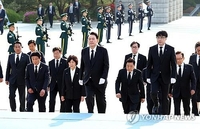 Yoon's approval rating sinks to lowest point since taking office
Yoon's approval rating sinks to lowest point since taking office
















